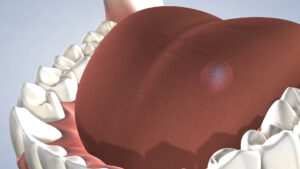
An unusual lump or growth in or around the mouth can happen to anyone. With early detection and treatment, we address the pathological process promptly and achieve better outcomes. Dr. Salin, Dr. Weiner, Dr. Semanoff, Dr. Nack, and Dr. Kosakowski are experienced in diagnosing and treating abnormal, cancerous, or disease-related growths in the mouth and jaw.
At Innovative Oral Surgery & Dental Implants, we use the most precise and advanced techniques to detect hidden oral health issues and rebuild facial structures, improving your oral health and restoring your confidence. If you notice an abnormality anywhere in the oral and maxillofacial region, or if it’s time for your oral cancer screening, contact our practice in Feasterville, Newtown, and Abington, PA, to schedule an appointment.
Oral pathology is a specialty of dentistry that focuses on detecting, diagnosing, and treating oral diseases, including oral cancer. Oral surgeons are trained to detect abnormalities in the oral and maxillofacial regions and manage conditions such as:
Many people who have oral cancer do not realize it, which is why oral cancer screenings and at-home exams are so important. When we can diagnose oral cancer and precancerous conditions early, there is a higher chance of successful treatment.
Attending regular dental exams every 6 months will help detect potential problems early. At cleaning appointments with most general dentists, an oral cancer screening is part of the appointment, which is why it is important to attend these checkup visits. Knowing how to perform a self-exam at home will help you know the warning signs of oral cancer, and you can perform these self-exams once per month in between your regularly scheduled dental checkups.
Here’s how to perform a self-exam:
Some symptoms of oral cancer are visible, while others are not. In addition to growths and lumps, be on the lookout for other symptoms such as:
If you notice any symptoms, contact our practice immediately for an evaluation from an oral and maxillofacial surgeon. We will take 3D scans of your head, neck, mouth, and face, and perform a more in-depth examination to diagnose the pathological process and address the issue before it presents a greater risk to your health.
Treating a pathological process will vary depending on the size, location, type, and severity of the condition. In many cases, we will take a biopsy of the growth or lesion and send the sample to a lab. The results will determine if the pathological process is benign (noncancerous) or malignant (cancerous). Most pathological processes are benign, but it is important to rule out cancer as soon as possible.
If there is a benign tumor or growth, we can simply remove it. Cold sores are a common oral lesion that we can treat with creams or medications. Other oral infections like oral thrush (candidiasis) can be treated with antifungal medications or mouth rinses. If the lesion or growth is cancerous, treatment may include surgery, radiation therapy, or chemotherapy.
Your oral surgeon will explain your diagnosis and walk you through all of your treatment options so you can make an informed decision about your care. Prior to any type of surgical procedure, we will discuss your anesthesia options to ensure your comfort. As oral surgeons, our experts are qualified to administer all types of anesthesia and sedation for the safety and comfort of our patients.
We offer a variety of choices to ensure a comfortable oral surgery experience.
Our board-certified oral surgeons perform oral cancer screenings at our offices in Feasterville-Trevose, Newtown, and Abington, PA. If you notice an abnormality in or around your mouth, or if you have not received an oral cancer screening from a trained dental professional in a while, we encourage you to contact Innovative Innovative Oral Surgery & Dental Implants for an appointment.
1300 Bridgetown Pike
Feasterville-Trevose, PA 19053
We Proudly Serve:
638 Newtown Yardley Rd #2A
Newtown, PA 18940
We Proudly Serve:
1494 Old York Road #2
Abington, PA 19001
We Proudly Serve:
For over 50 years, we have had the privilege of serving our communities with the highest level of oral surgery care. We love what we do, and we look forward to providing you and your loved ones with an outstanding patient experience and incredible results.
Administered through a syringe, a local anesthetic numbs only the surgical site. The effects can last up to several hours. We often pair local anesthesia with another type of anesthesia or sedation.
Commonly known as laughing gas, nitrous oxide is inhaled through a mask. It provides mild sedation and pain relief and is often combined with other options, such as oral sedation, for optimal effect.
General anesthesia will render you totally unconscious. This option is reserved for complex surgeries such as orthognathic surgery or facial reconstruction.
Your surgeon will inject the sedative into the vein, which will render you into a semi-conscious state. Also called twilight sedation or twilight dentistry, this option is ideal for extensive procedures or highly anxious patients.